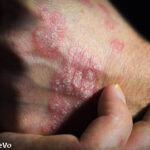New studies reveal predictors for avoidable RA hospitalizations, PsA transition in psoriasis & the impact of neighborhood on childhood lupus.


New studies reveal predictors for avoidable RA hospitalizations, PsA transition in psoriasis & the impact of neighborhood on childhood lupus.

Ustekinumab-stba (Steqeyma) now has FDA approval for all forms and dosages of its reference product, ustekinumab (Stelara), including a subcutaneous injection to treat pediatric patients with plaque psoriasis or psoriatic arthritis.
Maksymowych et al. assessed the frequency of axial spondyloarthritis (axSpA) according to extra-articular presentation and human leukocyte antigen B27 (HLA-B27) status and sought to identify features that distinguish patients with axSpA from those with non-specific back pain. Their data support recommendations that patients with chronic back pain and extra-articular features related to axSpA be screened for axSpA with MRI and referred to a rheumatologist.
Shashank Cheemalavagu, MD, Yuxuan Jin, MS, & M. Elaine Husni, MD, MPH |
Objective We aimed to identify clinical and demographic features associated with the interval between the appearance of psoriasis and the onset of psoriatic arthritis (PsA). Methods We identified patients with psoriasis and PsA diagnoses from our tertiary care psoriatic disease biorepository: a longitudinal, real-world database including clinical information and patient-reported outcomes. We used a multivariable,…

ORLANDO, FLORIDA — Given the intersection between rheumatology and dermatology for many patients with autoimmune diseases, it’s helpful to hear from specialists in both fields regarding disease management strategies.

After examining study data from pediatric patients with both psoriasis and psoriatic arthritis (PsA), the FDA approved ustekinumab as a treatment for patients aged 6–17 years old with PsA.

Recent research reinforces the finding that psoriasis patients have a slightly increased risk of cancer, specifically keratinocyte cancer and lymphomas. However, the study found no association between cancer and the use of biologic treatments in this patient population…

In a head-to-head study, ixekizumab was a more effective treatment for nail psoriasis than ustekinumab and resulted in greater skin clearance for patients with plaque psoriasis…

Research has shown ixekizumab improves pain and the sexual health of patients with genital psoriasis…
Reuters Staff |
NEW YORK (Reuters Health)—The ongoing novel coronavirus pandemic has raised concerns about whether biologic therapy could make psoriasis patients more susceptible to SARS-CoV-2, the virus behind COVID-19. Mark Lebwohl, MD, from Icahn School of Medicine at Mount Sinai Hospital in New York and colleagues address this issue in a letter in the Journal of the…